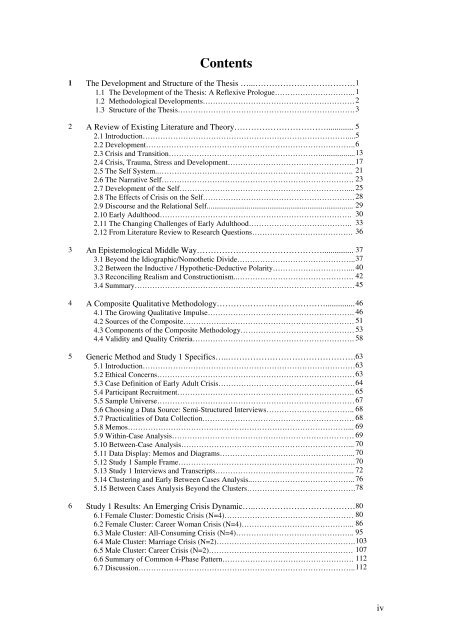DEVELOPMENTAL CRISIS IN EARLY ADULTHOOD: A ...
DEVELOPMENTAL CRISIS IN EARLY ADULTHOOD: A ...
DEVELOPMENTAL CRISIS IN EARLY ADULTHOOD: A ...
You also want an ePaper? Increase the reach of your titles
YUMPU automatically turns print PDFs into web optimized ePapers that Google loves.
Contents<br />
1 The Development and Structure of the Thesis …...……………………………… 1<br />
1.1 The Development of the Thesis: A Reflexive Prologue………………………….. 1<br />
1.2 Methodological Developments…………………………………………………… 2<br />
1.3 Structure of the Thesis……………………………………………………………. 3<br />
2 A Review of Existing Literature and Theory……………………………............. 5<br />
2.1 Introduction……………………………………………………………………….... 5<br />
2.2 Development……………………………………………………………………….. 6<br />
2.3 Crisis and Transition…………………………………………………….................. 13<br />
2.4 Crisis, Trauma, Stress and Development…………………………………………... 17<br />
2.5 The Self System..………………………………………………………………….. 21<br />
2.6 The Narrative Self…………………………………………………………………. 23<br />
2.7 Development of the Self………………………………………………………….... 25<br />
2.8 The Effects of Crisis on the Self…………………………………………………… 28<br />
2.9 Discourse and the Relational Self............................................................................. 29<br />
2.10 Early Adulthood…………………………………………………………………. 30<br />
2.11 The Changing Challenges of Early Adulthood………………………………….. 33<br />
2.12 From Literature Review to Research Questions…………………………………. 36<br />
3 An Epistemological Middle Way………………………………………............... 37<br />
3.1 Beyond the Idiographic/Nomothetic Divide……………………………………….. 37<br />
3.2 Between the Inductive / Hypothetic-Deductive Polarity…………………………... 40<br />
3.3 Reconciling Realism and Constructionism..………………………………………. 42<br />
3.4 Summary…………………………………………………………………………… 45<br />
4 A Composite Qualitative Methodology………………………………….............. 46<br />
4.1 The Growing Qualitative Impulse…………………………………………………. 46<br />
4.2 Sources of the Composite……………..…………………………………………… 51<br />
4.3 Components of the Composite Methodology……………………………………… 53<br />
4.4 Validity and Quality Criteria………………………………………………………. 58<br />
5 Generic Method and Study 1 Specifics…..………………………………………. 63<br />
5.1 Introduction………………………………………………………………………… 63<br />
5.2 Ethical Concerns…………………………………………………………………… 63<br />
5.3 Case Definition of Early Adult Crisis……………………………………………… 64<br />
5.4 Participant Recruitment……………………………………………………………. 65<br />
5.5 Sample Universe…………………………………………………………………… 67<br />
5.6 Choosing a Data Source: Semi-Structured Interviews…………………………….. 68<br />
5.7 Practicalities of Data Collection…………………………………………………… 68<br />
5.8 Memos……………………………………………………………………………... 69<br />
5.9 Within-Case Analysis……………………………………………………………… 69<br />
5.10 Between-Case Analysis…………………………………………………………... 70<br />
5.11 Data Display: Memos and Diagrams……………………………………………... 70<br />
5.12 Study 1 Sample Frame……………………………………………………………. 70<br />
5.13 Study 1 Interviews and Transcripts……………………..………………………... 72<br />
5.14 Clustering and Early Between Cases Analysis..………………………………….. 76<br />
5.15 Between Cases Analysis Beyond the Clusters……………………………………. 78<br />
6 Study 1 Results: An Emerging Crisis Dynamic…..……………………………… 80<br />
6.1 Female Cluster: Domestic Crisis (N=4)…………………………………………… 80<br />
6.2 Female Cluster: Career Woman Crisis (N=4)……………………………………... 86<br />
6.3 Male Cluster: All-Consuming Crisis (N=4)……………………………………….. 95<br />
6.4 Male Cluster: Marriage Crisis (N=2)………………………………………………. 103<br />
6.5 Male Cluster: Career Crisis (N=2)………………………………………………… 107<br />
6.6 Summary of Common 4-Phase Pattern……………………………………………. 112<br />
6.7 Discussion………………………………………………………………………….. 112<br />
iv
















